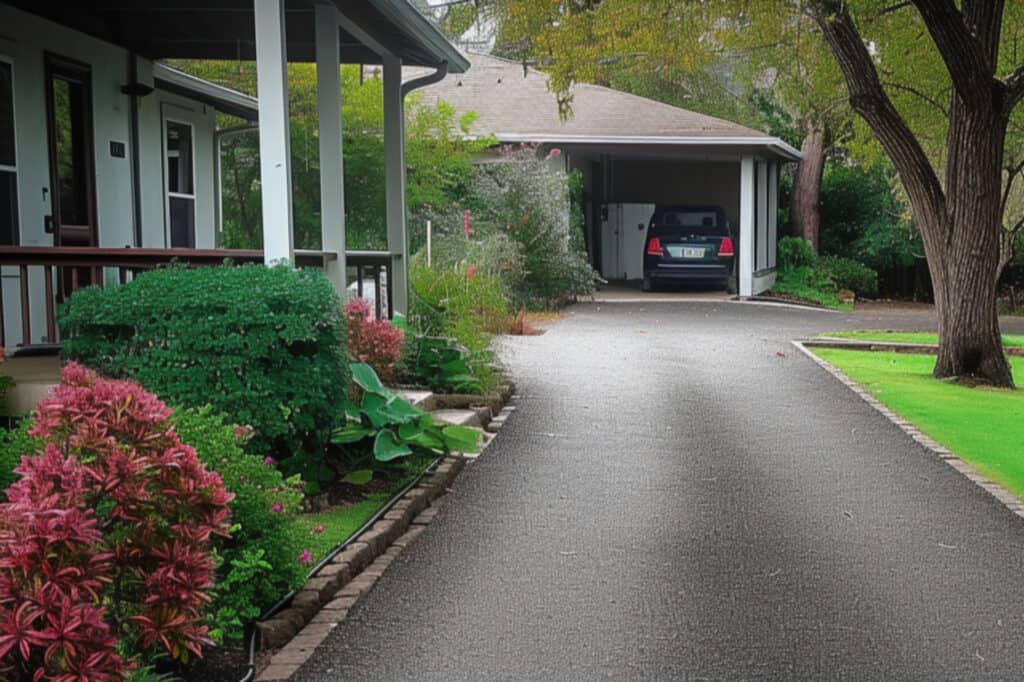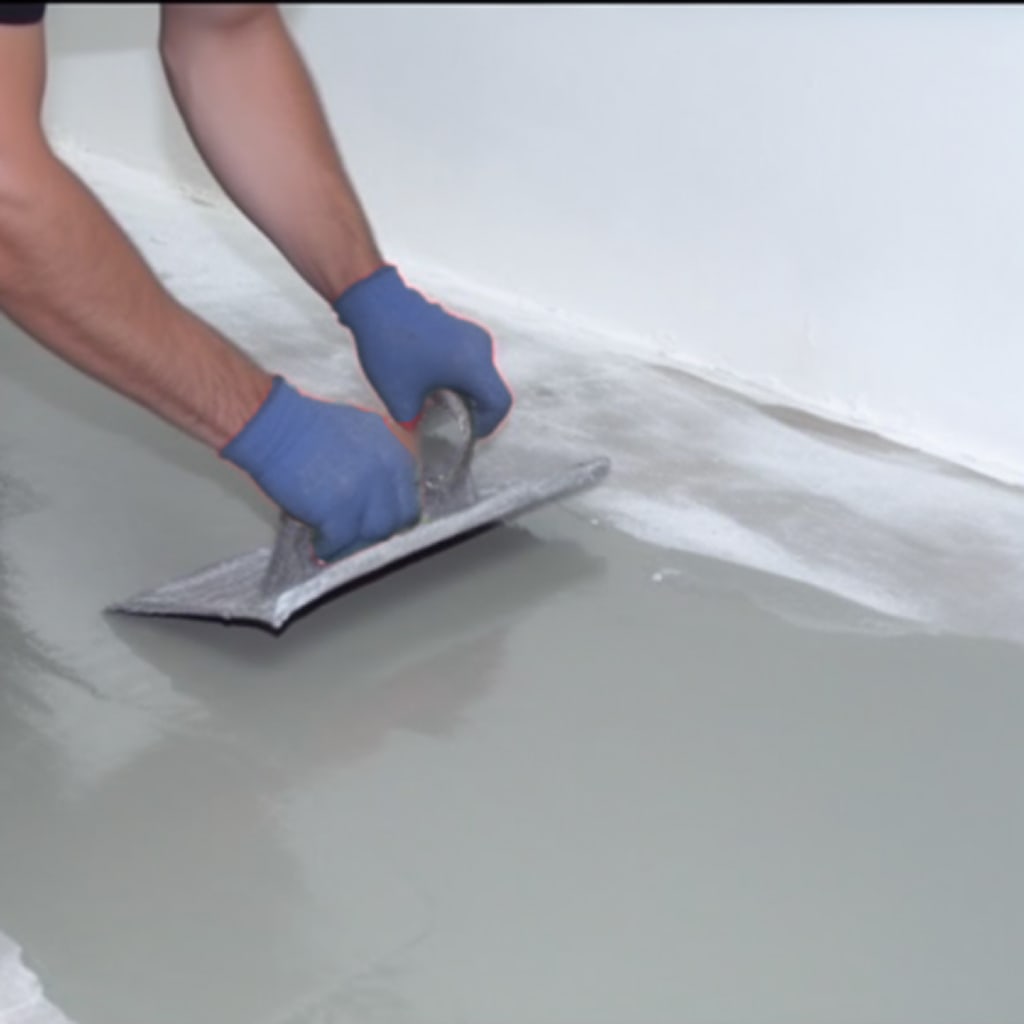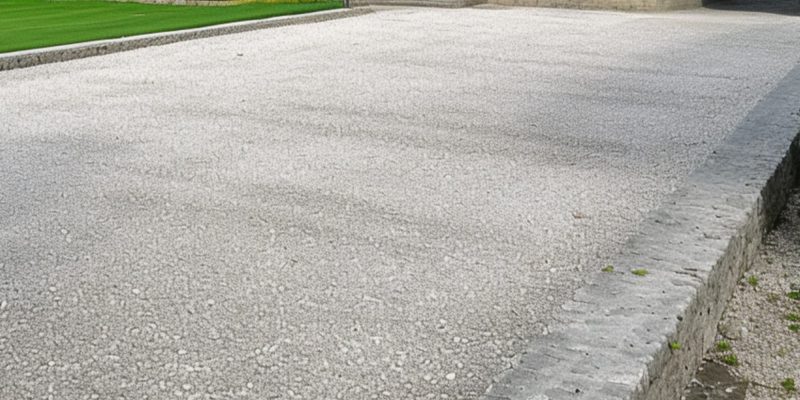Are you considering a rock driveway? Understanding the costs involved is crucial before diving into this home improvement project. This guide breaks down everything from average costs to the specifics of different gravel types, helping you make an informed decision.
How Much Does a Rock Driveway Cost?
When planning for a rock driveway, you should first understand the range of potential costs. The price can vary significantly based on several key factors, making an accurate estimate crucial for budgeting.
Average Costs
The national average cost of a rock driveway is typically around $1,500. However, this figure can fluctuate between $300 and $4,500, depending on various factors. In Joliet, local market conditions may cause these prices to differ. For instance, the availability of certain gravel types or local labor rates can impact the overall cost.
Factors Influencing Cost
Location and Market Trends: Joliet’s specific market conditions, such as the cost of materials and labor availability, can affect the final price. For example, if there’s a high demand for certain gravel types, their prices might be higher.
Gravel Type: Different gravel types come with different price tags. The choice between pea gravel, crushed stone, limestone, and other varieties will influence the overall cost. Each type has its specific use and aesthetic, affecting the price accordingly.
Driveway Size and Design: The larger the driveway, the more materials and labor are needed. Complex designs or additional features like borders or patterns also add to the cost.
Installation Options: Choosing between DIY and professional installation significantly impacts the budget. While DIY can be more affordable, it requires time and skill. Professional installation, though more costly upfront, ensures quality and durability.
Cost by Gravel Type
Choosing the right type of gravel for your driveway is a critical decision that impacts both the aesthetic and the budget. Let’s explore various gravel types along with their average costs.
- Bluestone Gravel: Known for its distinct blue-gray color, bluestone is a stylish option, costing around $4 to $5 per square foot.
- Caliche: A more cost-effective choice, caliche is a hardened calcium carbonate material, typically priced at about $0.45 to $0.65 per square foot.
- Crushed Granite: Popular for its durability and rustic look, crushed granite costs approximately $0.50 to $1.00 per square foot.
- Crushed Marble: Offering a unique aesthetic, crushed marble is priced slightly higher, typically around $1.20 to $1.50 per square foot.
- Crusher Run: A mixture of crushed stone and stone dust, crusher run is a sturdy option, costing about $0.40 to $0.70 per square foot.
- Crushed Shells: Crushed shells are an affordable option for a coastal look, generally available at $0.60 to $0.80 per square foot.
- Crushed Stone: Offers a firm foundation at a lower cost. It’s an economical choice for the bulk of the driveway. The average cost for crushed stone is typically around $0.50 to $1.00 per square foot.
- Limestone: While more expensive, limestone driveways can last longer and offer a distinctive look, which can add to the property’s curb appeal. Limestone gravel costs can range from about $2.00 to $4.00 per square foot.
- Pea Gravel: Ideal for a decorative finish but may require additional layers or edging to keep it in place. The cost can add up due to these additional requirements. Typically, pea gravel costs around $0.80 to $1.50 per square foot.
- River Rock: Known for its smooth and rounded texture, river rock can range from $1.50 to $2.00 per square foot.
- Steel Slag: A durable and eco-friendly choice, steel slag is a byproduct of steel production, typically costing around $0.30 to $0.50 per square foot.

Cost Breakdown
A detailed cost breakdown helps you understand where the money is going when installing a rock driveway.
Material Costs
Gravel: The bulk of the cost comes from the gravel itself. For a standard driveway, homeowners may need several tons.
Additional Materials: Items like landscaping fabric to prevent weed growth or edge restraints to keep gravel in place also contribute to the total cost.
Labor Costs
DIY: If you’re considering the DIY route, remember to factor in the rental costs for necessary tools like a compactor, which can vary from $50 to $100 per day. The physical effort and time commitment should also be considered.
Professional Installation: Professional services can range significantly in cost, often between $30 to $50 per hour. This includes site preparation, gravel laying, and finishing touches.
Tools and Equipment
DIY Tools: For DIY projects, tools like shovels, rakes, and wheelbarrows are essential. While some might be already available at home, others might need to be purchased or rented.
Professional Equipment: Professional installers bring their own equipment, which is typically more efficient and can complete the job faster.
Cost by Driveway Size
The size of the driveway is a major factor in determining the overall cost. You need to consider the dimensions of your driveway to accurately estimate the amount of materials and labor required.
Size Categories and Cost Implications
Single Car Driveway (10-12 feet wide): Suitable for one vehicle, these driveways require less gravel and labor, making them more affordable. For a basic single-car driveway, the cost might start from as low as $600 but can increase based on gravel type and installation choices.
Double Car Driveway (20-24 feet wide): Designed for two vehicles, these driveways need significantly more material and labor. Homeowners might expect to spend $1,800 to $2,500 or more, depending on the complexity of the design and the type of gravel chosen.
Factors Influencing Size-Based Cost
Material Volume: Larger driveways require more gravel, increasing material costs proportionately.
Labor Intensity: Larger areas take more time to prepare and cover, leading to higher labor costs, especially if professional installation is chosen.
RECOMMENDATION
You should measure your driveway area accurately to estimate the amount of gravel needed and the associated costs, keeping in mind that opting for premium materials or complex designs will increase the overall expenditure.
Additional Costs and Considerations
For homeowners considering a rock driveway, it’s crucial to factor in the basic costs of materials and labor and the additional expenses that can impact the overall budget.
Preparation and Landscaping Costs
Site Preparation: Clearing the land and ensuring a level base can cost between $1.50 to $2.00 per square foot, depending on the current condition of the land. If old pavement needs removal, this could add another $1 to $2 per square foot.
Drainage Solutions: Implementing proper drainage is critical for the longevity of the driveway. This could add an additional $500 to $1,000 to the total cost, depending on the complexity of the drainage system required.
Maintenance and Longevity
Regular Upkeep: Maintaining a gravel driveway typically involves adding new gravel every few years. This could cost around $100 to $300 annually, depending on the size of the driveway and the type of gravel used.

Durability Factors: High-quality gravel and professional installation can reduce long-term maintenance costs. Investing in higher-grade gravel might increase initial costs by 10-20% but can save money in the long run.
Geographic Variations
Climate Considerations: In Joliet, the weather can affect maintenance needs. Freezing and thawing cycles may require additional gravel replenishment, adding to annual maintenance costs.
Local Cost Variations: The cost of materials and labor can vary locally. For example, transportation costs could increase the overall price if a specific gravel type is not readily available in Joliet.
By considering these additional costs and considerations, you can develop a more accurate and comprehensive budget for your rock driveway project, ensuring no surprises down the road.
Comparing DIY and Professional Installation Costs
Deciding between a DIY project or hiring a professional for a rock driveway installation involves weighing the costs and benefits of both options. Let’s break down what each entails.
DIY Costs
Material Costs: These remain consistent whether you choose DIY or professional installation. However, sourcing and transporting the gravel yourself can offer some savings. For example, purchasing crushed stone might cost around $0.50 to $1.00 per square foot, amounting to $300 to $1,500 for an average driveway.
Equipment Rental: Necessary tools like a compactor or a wheelbarrow might need to be rented. Depending on the tool, these can range from $50 to $100 per day.
Time and Effort: The value of your time should be considered. DIY projects can be time-consuming and physically demanding, which might not suit everyone.
Professional Installation Costs
Labor Costs: This is the most significant additional cost when hiring professionals. Labor rates can vary from $30 to $50 per hour. Installation labor can total $500 to $1,000 for a standard driveway.
Quality and Efficiency: Professionals bring expertise, efficiency, and the right equipment, which can ensure a higher quality and longer-lasting driveway. This can offset the higher upfront costs in the long run.
Project Management: Professional installers manage the entire process, including site preparation, gravel laying, and cleanup, reducing the hassle for the homeowner.
Pros and Cons
When installing a rock driveway, there are pros and cons to DIY and hiring professionals. If you do it yourself, you can save on labor costs and enjoy the satisfaction of completing the project on your own. However, keep in mind that it can be time-consuming and physically demanding, and there’s a risk of lower quality if you lack experience.
On the other hand, hiring professionals ensures high-quality work, less physical effort for you, and faster completion. But, it also comes with higher upfront costs, and you may have less control over the project timeline.
DIY projects can offer cost savings, but professional installation ensures a higher quality…
DIY projects can offer cost savings but require significant time and effort. On the other hand, though more costly, professional installation ensures a higher quality and more durable driveway with less physical demand on the homeowner. The choice depends on individual preferences, budget, and personal capabilities.
Conclusion
In summary, the cost of a rock driveway varies based on factors like driveway size, gravel type, and whether you choose to DIY or hire professionals. By understanding these elements, you can better plan your project and choose an option that best fits your budget and home improvement goals. Remember, a well-planned rock driveway not only enhances your property’s aesthetic but can also be a cost-effective and durable solution for your home.
Frequently Asked Questions
What is the Cheapest Rock for a Driveway?
The most budget-friendly option for a driveway is typically Crusher Run, also known as Crush and Run. Crusher Run is a mixture of crushed stone and stone dust, creating a stable and durable surface. On average, it costs about $0.40 to $0.70 per square foot, making it an economical choice for homeowners looking for an affordable yet reliable solution for their driveway.
How Much Does a 100-Ft Gravel Driveway Cost?
The cost of a 100-foot gravel driveway varies based on factors like material type and depth. On average, for a driveway that is 10 feet wide and 100 feet long, using basic crushed stone at a depth of 4 inches, the cost can range from $1,200 to $2,500. This estimate includes both materials and professional installation. Prices may fluctuate based on gravel type and local labor rates.
How Much Does a Rock Driveway Cost Per Square Foot?
The cost per square foot for a rock driveway can range from $0.50 to $5.00, depending on the type of rock chosen. Basic options like crushed stone or Crusher Run are on the lower end of this range, costing about $0.50 to $1.00 per square foot, while premium choices like bluestone gravel can cost up to $5.00 per square foot. The price varies with the quality, aesthetic appeal, and longevity offered by different rock types.

